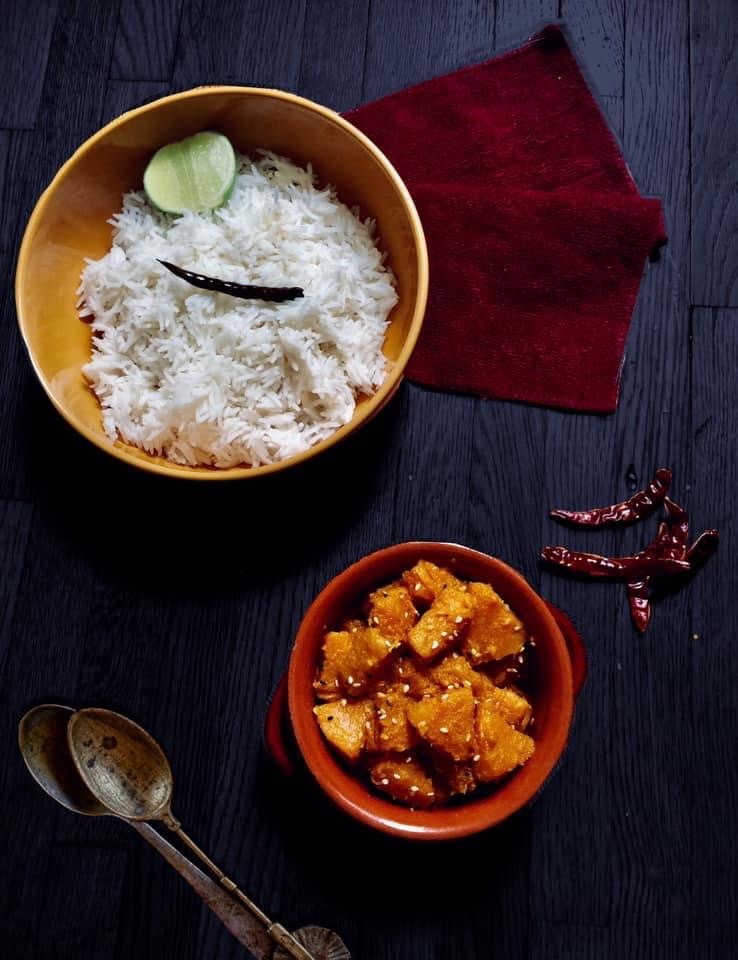Translated from the Bengali by Upama Mukherjee
Til Kumro, a common vegetarian dish:
Back then, we lived as a joint family. The shadow from the guava tree at the center of the yard flickered and played in the rooms on either side. Grandma read its movement and announced, “Supplies will show up any time now from the bazaar and your morning meal is not over yet! Hurry up, all of you!”
My grandpa, who was a school teacher, would have the rickshaw puller deliver whatever he gathered at the market. “Babu has sent,” the man showed up and grandma’s earthen oven fired up once again. Besides the stock of fresh vegetables that showed up from the market bag, a yam or a sweet pumpkin would always manage to turn up from her personal kitchen garden. The sweet pumpkin would eventually turn into Til Kumro, a staple with mash kolai daal with fennel tempering during the summer days.
I never saw separate ovens to prepare veg and non-veg in grandma’s kitchen. She would smear the oven with clay once before cooking the vegetarian dishes and say: “Fire has no vice!”
My mother and aunts would have finished peeling and cutting the vegetables and fish, and arranged everything on the veranda adjacent to the kitchen. By the time grandma showered, wrapped her saree, and got all done up with vermillion, ready for the day and came to fire up the oven and tackle the pumpkin which was kept aside for her to cut with her own hands, she said: “It doesn’t work unless the pieces are of equal sizes.”
Til Kumro was the last one to be prepared after all the items had been cooked. First, the mustard oil was heated and tampered with dried pepper and nigella seeds. Grandma stirred the spud to blend up the fragrance of seasoning with oil and added the pumpkin. The pieces shone brighter in color within the seasoned oil. Just a pinch of turmeric added to the frying pieces let out a fragrance that could outshine all other non-vegetarian items in the kitchen. Then went in a few red chilies and a dash of water before the vessel was covered up with an aluminum plate. Grandma smelled the vapor that escaped from the sides to know if the content inside was cooked to perfection. Then she removed the covering and threw in the final seasoning of sesame seeds and Til Kumro was ready to be served.
Mother yelled, “Moni, take your shower, Dadu will return for his tiffin break.” Grandpa, because his school was close by, used to come home for lunch. After taking a bath, he would follow diurnal prayer. Then he came up to the kitchen veranda, placed his stool, and called out: “Ginni, it’s time for you.”
There used to be boiled taro roots, chochchori made of vine spinach, and Til Kumro on grandpa’s plate beside light brown rice. And on my plate, the chochchori and Til Kumro were served. When I whined for that boiled Mankochu, mashed with raw chilies, grandma would say, “Those are for nourishment, to make your grandpa’s appetite better. You taste Til Kumro, see how sweet it tastes!”
I was so fond of my grandma. Finishing the pieces of pumpkins one by one from my plate, I would say, “Really sweet, now give me more!”
Notes:
Til– sesame seeds
Mouri phoron– the fennel seasoning, commonly used for Bengali dishes.
Ginni– literally means wife, here used as an endearing term for the granddaughter.
Chochchori– a Bengali dry dish of spiced vegetables, served with rice.
The above is an excerpt from Smriti Bhadra’s book Roshui Ghorer Royak (Days In The Kitchen), first published in 2021. The book is a collection of eclectic recipes from the author’s bygone days. Not merely a book of recipes with meticulous instructions and information, it presents itself as a food memoir wherein the author reminisces about her life through myriad food items that are intrinsically entwined with her cultural identity. This is the second part of the series of the translated book. To read the first part, click on the following link:
To read the following third, fourth, fifth, and sixth parts, click on the following links:
Also, read a Bengali short story by Atin Bandopadhay, translated to English by Ankita Bose, and published in The Antonym.
Follow The Antonym’s Facebook page and Instagram account for more content and exciting updates.




























The word is tempering not tampering. Please correct.